Observatorio militar para la igualdad entre mujeres y hombres en las Fuerzas Armadas
Dirección: C/ Joaquín Costa núm. 6 - 28071 Madrid
Teléfono: 913 246 431
Correo electrónico: omigualdad@oc.mde.es
Correo electrónico área internacional: omi.int@mde.es
Funciones
- Analizar, debatir y, en su caso, realizar propuestas para mejorar la incidencia que las actividades relacionadas con el desarrollo de la carrera militar tienen sobre la igualdad efectiva y real entre mujeres y hombres, así como sobre la conciliación de la vida personal, familiar y laboral.
- Hacer seguimiento y conocer las principales aportaciones del Comité de Perspectivas de Género de la OTAN y sobre el desarrollo del conjunto de acciones sobre mujeres, paz y seguridad, especialmente en el ámbito de Naciones Unidas, OTAN y Unión Europea.
- Analizar la información estadística sobre la mujer en las Fuerzas Armadas, especialmente la comparativa con el hombre en relación con las medidas de conciliación y la Unidad de destino.
- Promover, analizar y difundir, especialmente en el ámbito de las Fuerzas Armadas, información que favorezca la integración de la mujer.
- Analizar las cuestiones relacionadas con la igualdad y la conciliación de la vida profesional, personal y familiar en las Fuerzas Armadas que se le planteen a este órgano.
- Conocer, cuando se considere necesario, las Memorias del análisis de impacto normativo de las medidas que se establezcan en los anteproyectos y proyectos dispositivos del Ministerio de Defensa y cualquier otra que guarde relación con el objeto de este órgano.
- Todas aquellas cuestiones que, dentro de las competencias de este órgano colegiado, puedan resultar de análoga significación a las anteriores y contribuyan al cumplimiento de sus fines.
Más información
1. A Comprehensive Approach to Gender in Operations
An international course for middle management civilian and military professionals
 The course “A Comprehensive Approach to Gender in Operations” is the result of a unique collaboration between the Spanish and Dutch Ministries of Foreign Affairs (Ministry of Foreign Affairs The Netherlands), (Ministry of Foreign Affairs Spain) and Defence (Ministry of Defence The Netherlands), (Ministry of Defence Spain). It is one of the expressions of the firm commitment of both the Netherlands and Spain to implementing UN Security Council
The course “A Comprehensive Approach to Gender in Operations” is the result of a unique collaboration between the Spanish and Dutch Ministries of Foreign Affairs (Ministry of Foreign Affairs The Netherlands), (Ministry of Foreign Affairs Spain) and Defence (Ministry of Defence The Netherlands), (Ministry of Defence Spain). It is one of the expressions of the firm commitment of both the Netherlands and Spain to implementing UN Security Council
Resolution 1325 and following resolutions on Women, Peace and Security.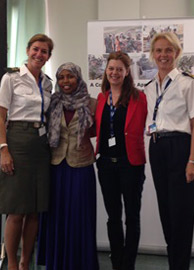 With the shift from international to local conflicts in the last decades we see a clear rise of gender based violence against the civilian population by combatants. Commanders in operations increasingly have to deal with gender based attacks specifically targeting woman and girls, but also men and boys. To effectively deal with this aspect of modern conflicts it’s important to understand how gender differences are perceived locally, where these differences can or are abused in a conflict and how to create a safe and secure situation for all persons, independent of gender. This aspect needs to be fully integrated in operations, from the planning phase till the end of the mission.
With the shift from international to local conflicts in the last decades we see a clear rise of gender based violence against the civilian population by combatants. Commanders in operations increasingly have to deal with gender based attacks specifically targeting woman and girls, but also men and boys. To effectively deal with this aspect of modern conflicts it’s important to understand how gender differences are perceived locally, where these differences can or are abused in a conflict and how to create a safe and secure situation for all persons, independent of gender. This aspect needs to be fully integrated in operations, from the planning phase till the end of the mission.
An effective implementation of both a comprehensive approach and a gender approach calls for an open attitude towards interacting with the people engaged in the conflict and affected by the conflict. The comprehensive approach is also about breaking the (perceived) barriers between participants in a course on gender in international missions and operations. Why? Because it is a must to be able to work as an effective and united team. A team that consists of military and civilians, and that makes use of their broad range of skills and expertise. A mission in which all personnel can count on each other, and can act against the systemic violation of human rights. A team that will act and never look away.
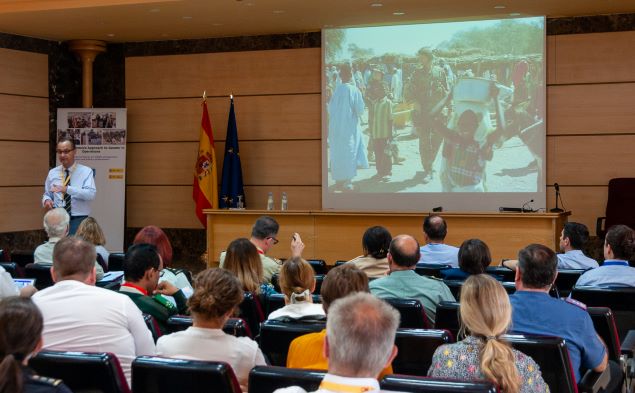
“A Comprehensive Approach to Gender in Operations” is a one week (5 days) course under the aegis of the European Security and Defence College (ESDC Web Site). It is based on the comprehensive approach to integrated missions and crisis management, and builds on synergies between Defence, diplomacy and development with regards to gender and human rights aspects. The course aims for participants to:
Recognize the different impact of conflicts on men and women, as well as opportunities and challenges for women to participate equally in conflict resolution, crisis management and reconstruction, and to translate this to operational planning and implementation.
Promote the necessity to distinct the diverse security needs and perspectives of the local male and female population in a mission area as an essential element for increasing operational effectiveness and improving the overall security situation;
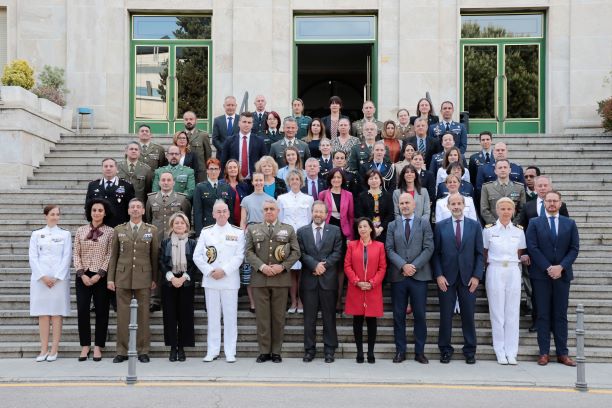
Since 2011, more than 1000 military and civilian participants from over 50 countries and from various international organizations have taken this innovative course. If each and every one of these participants has taken just as little as one remark, one moment, one story that touched them and put this in practice in their daily work, and the decisions they make, then we have reached our goal, and created 1020 new change agents who will never look away!
The courses are foreseen on the following dates:
- Spain: 2024 June 23-27 June 2025
- The Netherlands (The Hague): 22-26 November 2025 (TBC)
Donwload documents:
- Invitation to apply for the Gender Course (Doc - 640 KB)
- Application form Gender Course (Doc - 58 KB)
2. 'Gender in Peace Support Operations'
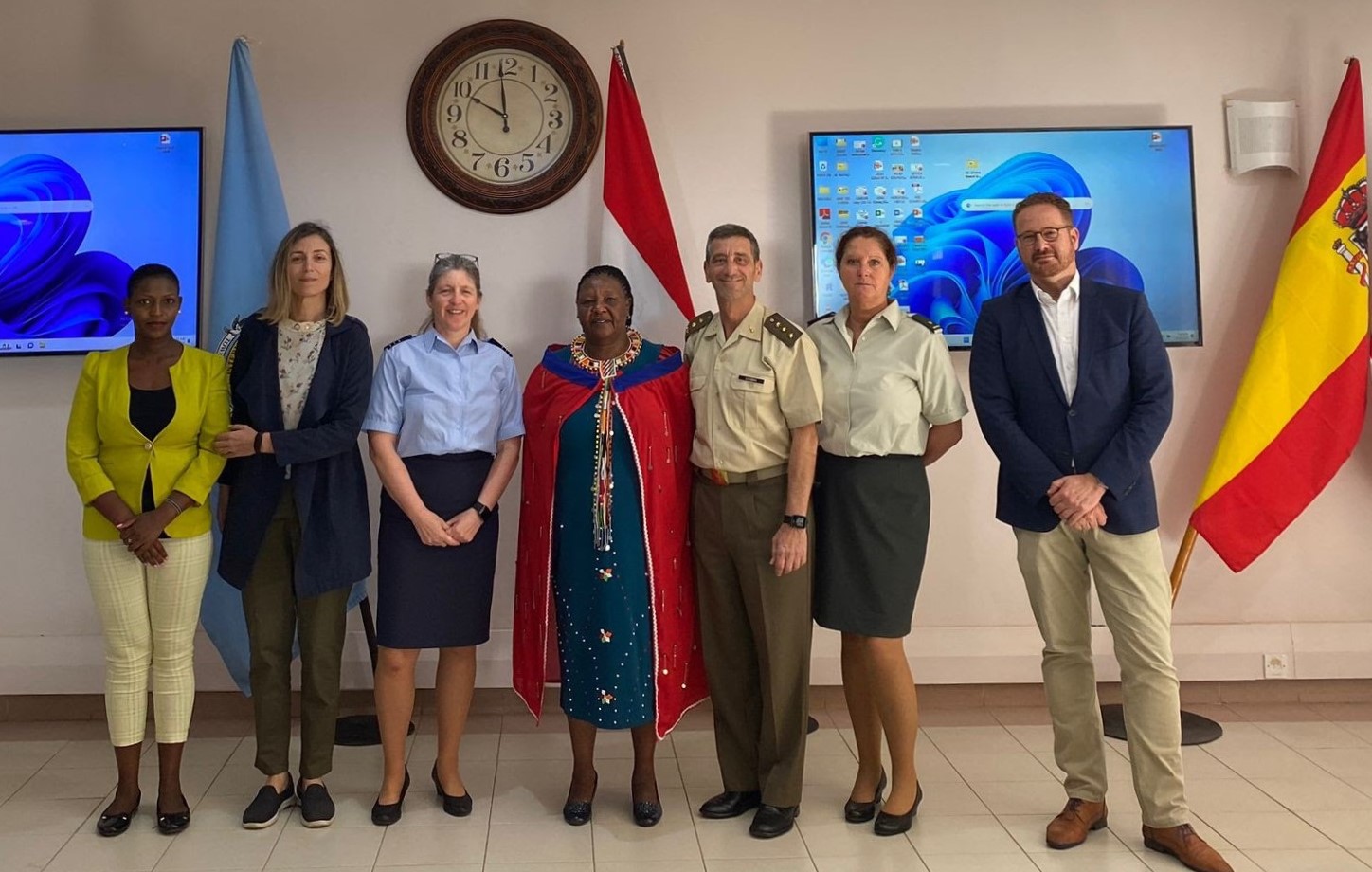
The Ministries of Foreign Affairs and Defence of Spain and the Netherlands organize the course “Gender in Peace Support Operations” in different countries of Africa. From 2013 to 2023, it has been held every six months in Nairobi, in collaboration with the US African Command (AFRICOM) and hosted by the International Peace Support Training Centre (IPSTC).
In March 2024, the first edition of this training was organized in Dar es Salaam in cooperation with the Tanzanian Peacekeeping Training Center (TPTC). 42 officers of the Tanzania People's Defense Forces have been trained for the first time in gender mainstreaming.
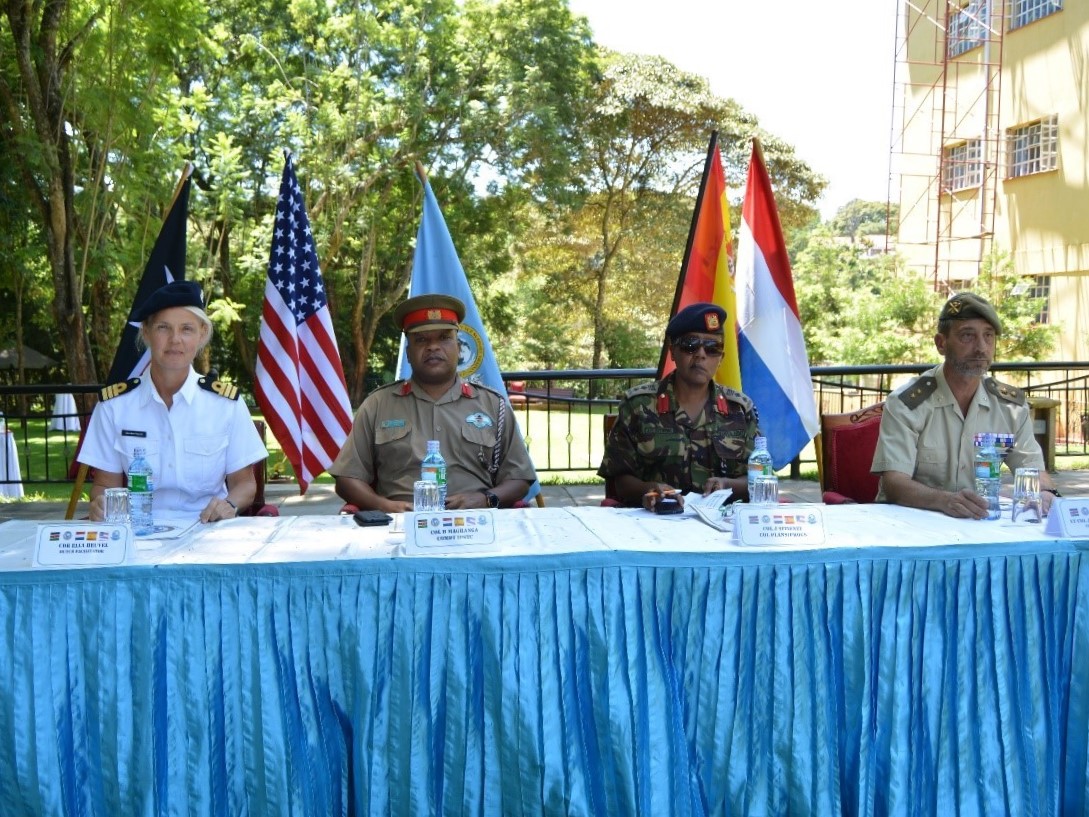
The course is primarily aimed at middle management military officials and civilians, including police, from African nations. It provides training to peacekeepers on “gender mainstreaming” in peacekeeping operations, which has emerged as a critical aspect of UN Department of Peace Operations policies, guidance notes, guidelines, and strategies.
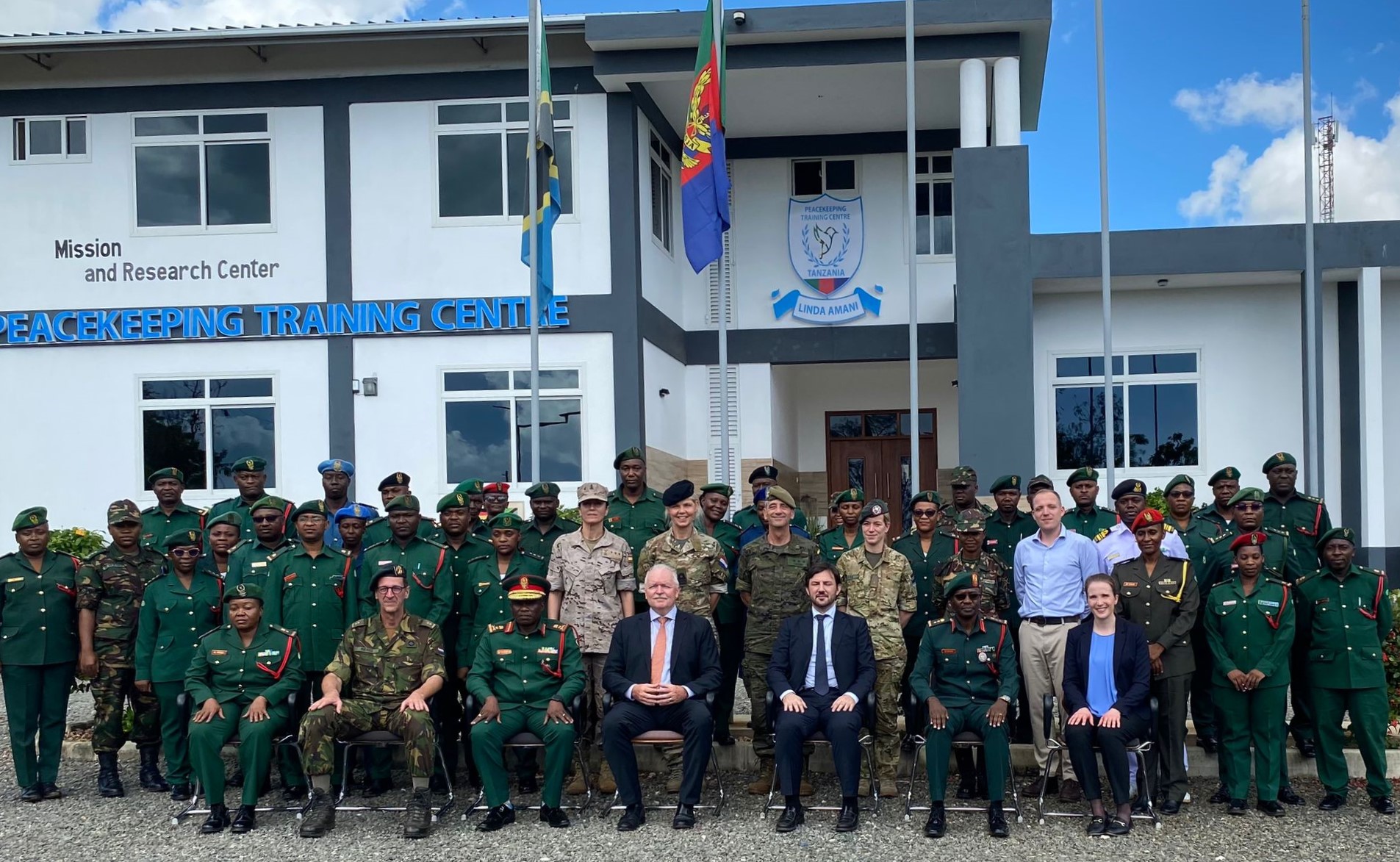
Women and men experience conflict differently and therefore understand peace differently. Recognizing and integrating these differences—known as gender perspectives—into all aspects of UN peace operations, is essential for the success of the UN’s efforts. Course participants will be provided the tools to ensure that gender perspectives are integrated into all elements of peacekeeping operations (including Security Sector Reform; Disarmament, Demobilization and Reintegration; Police; Military; Elections) from initial planning through evaluation.
So far, there have been 15 editions in which around 550 participants from 26 different countries have participated.
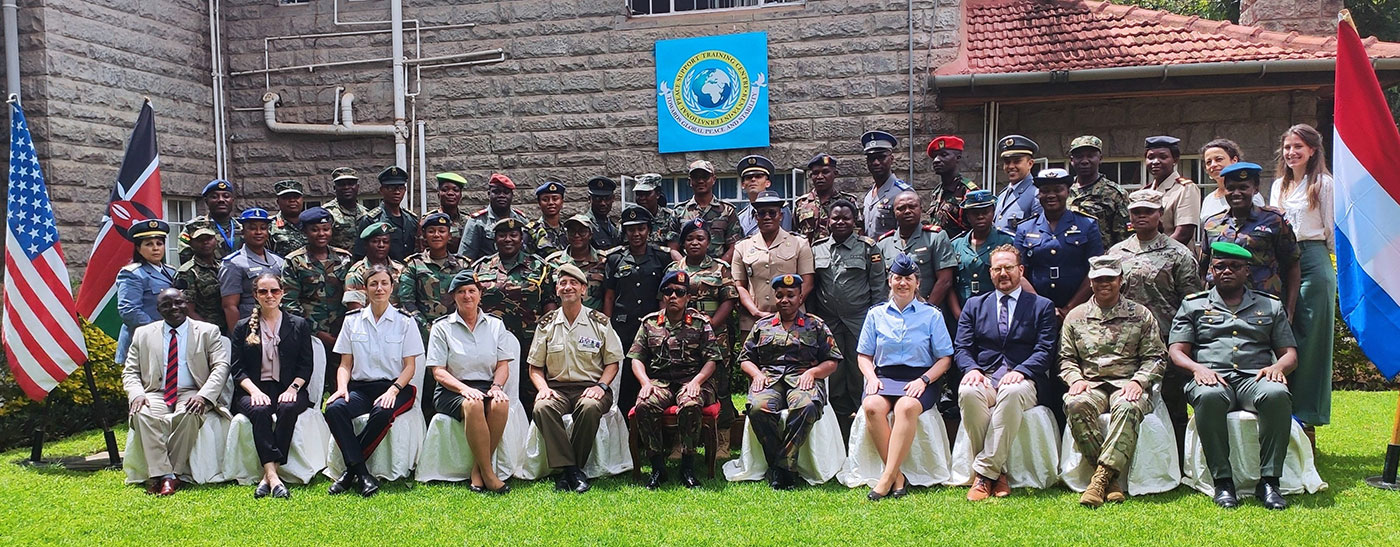
3.“ Gender Discipline Leader for CSDP Missions and Operations”
The EU Military Committee has appointed the Ministry of Defence of Spain as EU Gender Military Training Discipline Leader for Common Security and Defence Policy (CSDP) missions and operations. A Training Analysis Requirement (TRA) has been done to analyze the current situation in this field across the European Union Structures to look into whether the education and training are the most appropriate or must they be enhanced.
The TRA aim is to know the current situation of the gender training in the Armed Forces of the EU Member States prior to be deployed in a CSDP Missions or Operation. To detect gender training lack or shortfalls. To map the training possibilities and to give guidance or directions to Member States Armed Forces to train their military personnel during the Pre Deployment Training phase or In-mission Training.
The methodology used has been quite diverse. On the one hand, a survey was undertaken to collect information from different sources. Two questionnaires were prepared and agreed with the European External Action Service (EEAS) and other institution’s stakeholders. The survey was carried out among the EU Member States, the training and education centers and the CSDP missions and operations gender advisors or representatives and part of the staff.
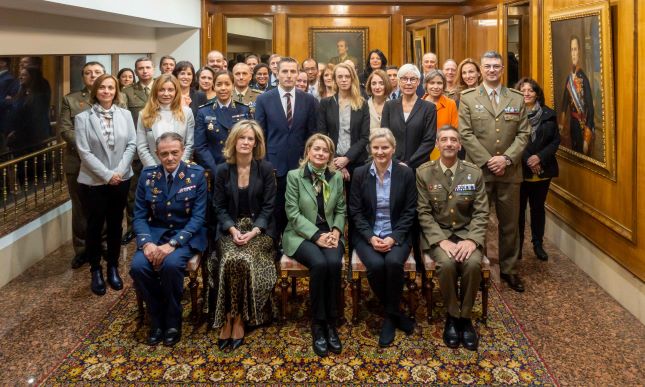
On the other hand, a second source of information was provided through the organization and participation in seminars, workshops, meetings and other events and to gather experienced personnel in areas such as training, operations or gender to enhance the knowledge of the topic. Another baseline for the definition of the curricula has been the wide number of documents about gender mainstreaming published all over the world, and especially those issued by training and education centers.
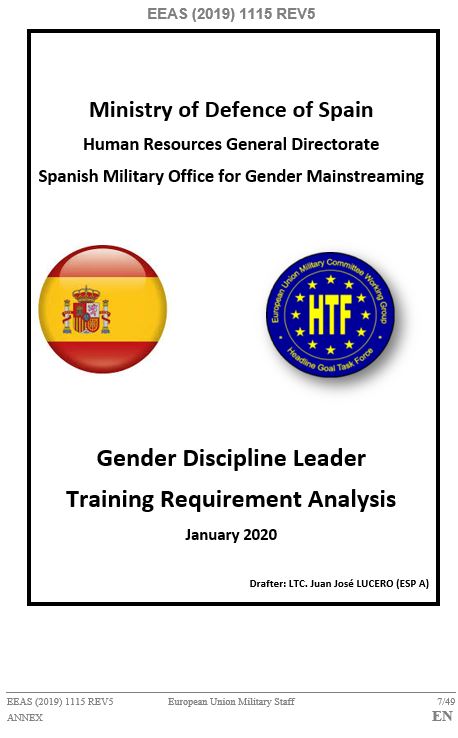
Although the TRA falls under the European Union Military Training Group (EUMTG), the study also provides information regarding the training of the of the civilian CSDP missions staff.
In the different annexes of the document, is widely explained the findings of the survey.
Three curricula have been prepared according with the needs and responsibilities of the proposed target audience and their relationship with gender mainstreaming.
The first curriculum is oriented to Gender Advisors and Gender Focal Points. It is likely recommended that Staff Officers, Planners and, in summary, all the deployed staff directly related to gender mainstreaming or decision makers follow this training. The main aim of the training is to provide knowledge to incorporate the gender perspective in all the phases of an operation, from the planning to the conduction and the evaluation.
The second curriculum is oriented to Force Commanders and Key Leaders. It also can be done by Staff Officers and/or Planners if they are not included in the first type of training. The main aim of the training is to become Gender Sensitive Leaders by knowing all aspects of gender mainstreaming. Second aim is to be aware that the implementation of the Gender Perspective in an Operation or Mission enhance the operational efficiency.
The third curriculum is oriented from enlisted personnel up to Platoon Leaders and all the deployed staff that do not have tasks directly related to gender. This is, all those who only need to know basic concepts and how to deal with the gender mainstreaming.
The Gender Discipline Leader has prepared a set of presentations for the Key leaders and Basic Curricula that EUMS has distributed among EU Member States and different EU Bodies. This allows to fill the training gaps in the subjects related in the TRA regarding the two referred curricula.
Estadísticas
- Informe 2024 de evolución de la mujer y el hombre en las Fuerzas Armadas
- Informe 2023 de evolución de la mujer y el hombre en las Fuerzas Armadas
- Informe 2022 de evolución de la mujer y el hombre en las Fuerzas Armadas
- Informe 2021 de evolución de la mujer y el hombre en las Fuerzas Armadas
- Informe 2020 de evolución de la mujer y el hombre en las Fuerzas Armadas
- Informe 2019 de evolución de la mujer y el hombre en las Fuerzas Armadas
- Informe 2018 de evolución de la mujer y el hombre en las Fuerzas Armadas
- Informe 2017 de evolución de la mujer y el hombre en las Fuerzas Armadas
- Informe 2016 de evolución de la mujer y el hombre en las Fuerzas Armadas
- Informe 2015 de evolución de la mujer y el hombre en las Fuerzas Armadas
- Informe 2014 de evolución de la mujer y el hombre en las Fuerzas Armadas
- Informe 2013 de evolución de la mujer y el hombre en las Fuerzas Armadas
- Informe 2012 de evolución de la mujer y el hombre en las Fuerzas Armadas
- Informe 2011 de evolución de la mujer y el hombre en las Fuerzas Armadas
- Informe 2009 de evolución de la mujer y el hombre en las Fuerzas Armadas
- Informe 2008-09 de evolución de la mujer y el hombre en las Fuerzas Armadas
- Informe 2007-08 de evolución de la mujer y el hombre en las Fuerzas Armadas
- Informe 2006-07 de evolución de la mujer y el hombre en las Fuerzas Armadas
- Informe anual OTAN sobre Aplicación de Perspectivas de Género
Enlaces de interés
- Naciones Unidas
- UN WOMEN
- CSW
- Oficina del Asesor de Género del IMS y Comité de Perspectivas de Género de la OTAN
- OSCE
- ODIHR
- Delegación del Gobierno contra la Violencia de Género
- Instituto de la Mujer
- Women in International Security
- Spanish Women in International Security
Referencias normativas de ámbito militar
- Orden DEF 253/2015, de 9 de febrero, por la que se regula el régimen de vacaciones, permisos, reducciones de jornada y licencias de los miembros de las FAS.
- Orden DEF 1363/2016, de 28 de julio, por la que se regulan la jornada y el régimen de horario habitual, en el lugar de destino de los miembros de las FAS.
- Real Decreto 456/2011, de 1 de abril, por el que se aprueba el reglamento de destinos del personal militar profesional.
- Real Decreto 1111/2015, de 11 de diciembre, por el que se aprueba el reglamento de adquisición y pérdida de la condición de militar y situaciones administrativas de los militares profesionales.
- Orden DEF/111/2019, de 8 de febrero, por la que se regula la estructura y funcionamiento del Observatorio Militar para la igualdad entre mujeres y hombres en las Fuerzas Armadas.
- Real Decreto 205/2024, de 27 de febrero, por el que se desarrolla la estructura orgánica básica del Ministerio de Defensa.
- Real Decreto 293/2009, de 6 de marzo, sobre medidas de protección de la maternidad en el ámbito de la enseñanza de las Fuerzas Armadas.
- Real Decreto 1051/2020 de 1 de diciembre, por el que se aprueba el Reglamento de ordenación de la enseñanza de formación en las Fuerzas Armadas.
- Real Decreto 309/2021, de 4 de mayo, por el que se aprueba el Reglamento de ingreso y promoción en las Fuerzas Armadas.
- Orden DEF/509/2007, de 6 de marzo, por la que se crea el premio 'Soldado Idoia Rodríguez, mujer en las Fuerzas Armadas'.
Referencias normativas de ámbito civil
- Ley Orgánica 3/2007, de 22 de marzo, para la igualdad efectiva de mujeres y hombres.
- Ley Orgánica 1/2004, de 28 de diciembre, de Medidas de Medidas de Protección Integral contra la Violencia de Género.
- Real Decreto Legislativo 5/2015, de 30 de octubre, por el que se aprueba el texto refundido de la Ley del Estatuto Básico del Empleado Público.
- Resolución de 28 de febrero de 2019, de la Secretaría de Estado de Función Pública, por la que se dictan instrucciones sobre jornada y horarios de trabajo del personal al servicio de la Administración General del estado y sus organismos públicos.
Referencias normativas de Ámbito Internacional
- Resolución 1325/2000 del Consejo de Seguridad de Naciones Unidas.
- Convención sobre la eliminación de todas las formas de discriminación contra la mujer (CDAW).
- BI STRATEGIC COMMAND DIRECTIVE (BI-SCD) 40-1
- Plan de Acción para la Igualdad de Género y el Empoderamiento de las Mujeres en la Acción Exterior 2021-2025 (GAP III) de la UE.
- NATO/EAPC Women Peace and Security Action Plan 2021-2025.
- NATO Policy on Preventing and Responding to Conflict-Related Sexual Violence.
- NATO Policy on Preventing and Responding to Exploitation and Abuse.
- NATO and Human Security.
- NATO Gender Perspectives in the Armed Forces – Summary of the National Reports
Otros documentos
- Plan Estratégico para la Igualdad Efectiva de Mujeres y Hombres (PEIEMH 2022-2025)
- III Plan para la Igualdad entre mujeres y hombres en la Administración General del Estado y en sus organismos públicos. (AGE)
- II Plan Nacional de Acción para la aplicación de la Agenda Mujeres, Paz y Seguridad.
En construcción





